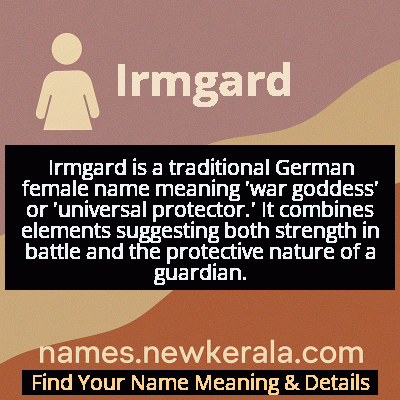Irmgard Name Meaning & Details
Origin, Popularity, Numerology Analysis & Name Meaning of Irmgard
Discover the origin, meaning, and cultural significance of the name IRMGARD. Delve into its historical roots and explore the lasting impact it has had on communities and traditions.
Name
Irmgard
Gender
Female
Origin
German
Lucky Number
7
Meaning of the Name - Irmgard
Irmgard is a traditional German female name meaning 'war goddess' or 'universal protector.' It combines elements suggesting both strength in battle and the protective nature of a guardian.
Irmgard - Complete Numerology Analysis
Your Numerology Number
Based on Pythagorean Numerology System
Ruling Planet
Neptune (Ketu)
Positive Nature
Intuitive, analytical, spiritual, and inquisitive.
Negative Traits
Secretive, reserved, aloof, and can be overly critical.
Lucky Colours
Green, yellow.
Lucky Days
Monday.
Lucky Stones
Cat’s eye, moonstone.
Harmony Numbers
1, 5, 6.
Best Suited Professions
Scientists, researchers, spiritual leaders, detectives.
What People Like About You
Depth of knowledge, analytical skills, spirituality.
Famous People Named Irmgard
Irmgard Keun
Novelist
Prominent German writer known for her Weimar Republic-era novels and resistance against Nazi censorship
Irmgard Furchner
Historical figure
Former Nazi concentration camp secretary tried for war crimes in her 90s, representing late-stage accountability
Irmgard Bartenieff
Dance therapist and researcher
Pioneer in dance therapy and movement analysis, founder of the Laban/Bartenieff Institute of Movement Studies
Irmgard of Chiemsee
Abbess and saint
Benedictine abbess and saint, daughter of King Louis the German, known for her piety and leadership
Name Variations & International Equivalents
Click on blue names to explore their detailed meanings. Gray names with will be available soon.
Cultural & Historical Significance
The name's cultural significance extends beyond its noble and religious associations to represent a particular archetype of German femininity - strong, reliable, and protective. In literature and folklore, characters named Irmgard often embody these qualities, serving as matriarchal figures or moral centers in their communities. The name's decline in recent generations reflects broader cultural shifts away from traditional Germanic names, yet it remains an important part of German cultural heritage, representing a connection to medieval and early modern German history and the values associated with that era.
Extended Personality Analysis
Women named Irmgard are often perceived as strong-willed, dependable, and protective individuals. They typically exhibit a natural leadership quality combined with practical wisdom, making them excellent problem-solvers in challenging situations. Their strength is not merely physical but manifests as emotional resilience and moral fortitude, allowing them to stand firm in their convictions while supporting those around them. Irmgards often possess a deep sense of responsibility and loyalty to family and community, embodying the protective qualities suggested by the name's meaning.
These individuals tend to be traditional yet progressive, valuing stability while recognizing the need for measured change. Their combination of strength and nurturing qualities makes them both respected leaders and trusted confidantes in their social circles. Irmgards are often seen as pillars of their communities - the people others turn to in times of crisis because of their calm demeanor and practical approach to problem-solving. While they may appear reserved initially, they form deep, lasting relationships built on mutual respect and trust. Their protective nature extends beyond physical safety to emotional and moral guidance, making them natural mentors and advisors.
Modern Usage & Popularity
In contemporary times, Irmgard has become quite rare as a given name, primarily found among older generations in German-speaking countries. The name peaked in popularity during the 1920s-1940s but has since declined significantly, with few parents choosing it for newborns in recent decades. According to German naming statistics, Irmgard hasn't ranked among the top 500 girls' names since the 1970s. However, it maintains a presence as a middle name and occasionally appears in artistic or literary contexts where historical German authenticity is desired. The shortened form 'Irma' remains more common internationally, though also declining. Modern usage often reflects a connection to family heritage or an appreciation for traditional Germanic names with strong historical roots, rather than contemporary naming trends.
Symbolic & Spiritual Meanings
Symbolically, Irmgard represents the duality of protection and strength - the enclosure that safeguards while the warrior spirit defends. The name embodies the concept of the 'hearth guardian' who protects home and community with both nurturing care and formidable strength when threatened. It symbolizes universal protection, suggesting someone who safeguards not just immediate family but broader principles and communities. The warrior goddess aspect represents moral courage and the strength to fight for what is right, while the protective element signifies creating safe spaces for growth and development. This combination makes Irmgard symbolic of balanced leadership - both fierce in defense and gentle in protection, embodying the ideal of strength tempered by wisdom and compassion.

